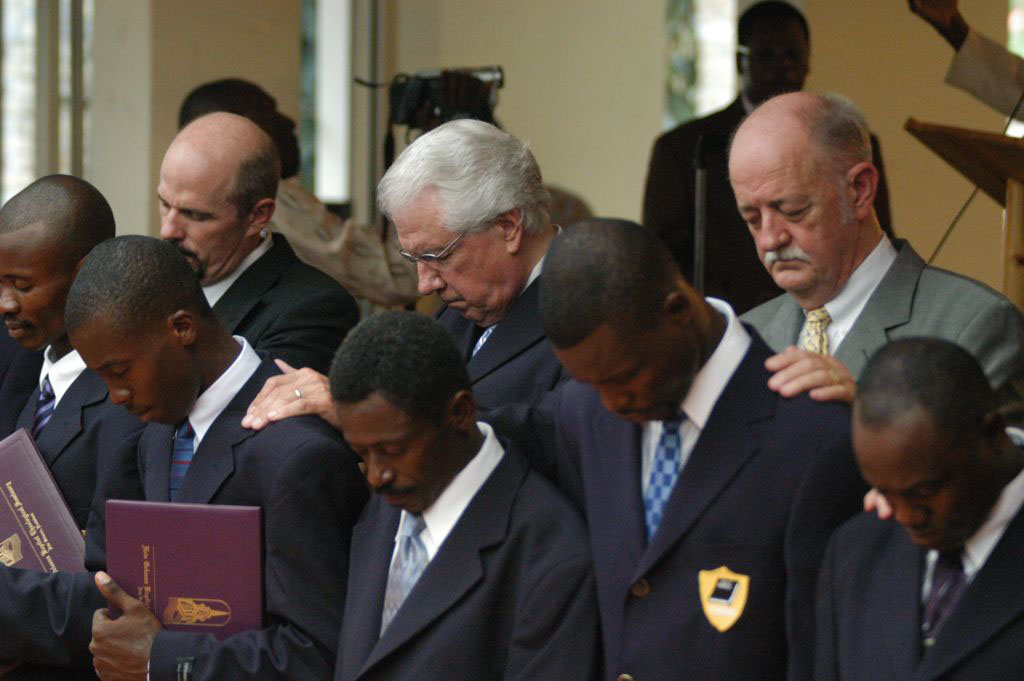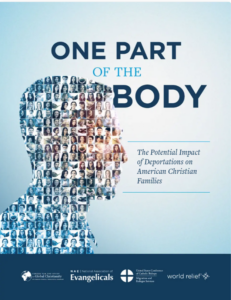
PORT AU PRINCE (BP)–Culminating 30 months of study underwritten by the Florida Baptist Convention, 52 Haitian pastors were the first ever to receive certificates in pastoral ministry from New Orleans Baptist Theological Seminary during a Sept. 14 ceremony in Port Au Prince.
The ceremony was held in conjunction with the National Assembly of the Confraternité Missionnaire Baptiste d’Haïti (CMBH) in a community building large enough to accommodate the 500 Haitian Baptists attending the annual meeting.
Through an interpreter, graduate Delouis Labranche, who works as director of missions for Haitian Baptists’ Northwest Association, called the graduation day “the last drop spilling over the cup. This has been an answer to a longtime prayer for my country — to provide theological training and to equip spiritual leaders to face today’s challenges in the life of the Haitian work in Haiti.”
LaBranche said the training of the men will have a rippling effect within the churches. “This must be an ongoing ministry as Jesus did by training, empowering and sending the 12 disciples to conquer the whole world. I can see the impact of this ongoing ministry to reach and to conquer Haiti for Christ.”
The training initiative was a collaborative effort between NOBTS and the Florida convention, which has had a decade-long partnership with Haitian Baptists. Pastors receiving the certificates have never had any type of formal theological education training.
The certificate program, which is also offered in the States, is designed to provide training for pastors who do not have theological education available, said Jimmy Dukes, NOBTS associate provost.
To qualify for the certificate, students took eight one-semester-hour courses in Baptist doctrine, discipleship, evangelism, homiletics, Christian education, introduction to Old and New Testament study, and an Old and New Testament book study.
“The graduation was one of the most rewarding experiences I have had in theological education,” said Dukes, who traveled to the Caribbean island to participate in the ceremony. “The commitment and the enthusiasm of the graduates and their families made a profound impression on me.”
Having taught one of the classes, Dukes said, “I knew the ability and intelligence of the students, and to see them come to the point of graduation was an occasion for real rejoicing.”
In addition to Dukes, the courses were taught by Florida convention personnel and Florida Baptist pastors Tommy Green of First Baptist Church in Brandon and Larry Bazer of First Baptist Church in Melbourne.
The graduation was the fulfillment of a decade-long vision by Florida Baptists, said John Sullivan, executive director-treasurer of the Florida convention, who was the commencement speaker. At the beginning of the partnership, the state convention was committed to three priorities, he said, “evangelism without apology, new church starting and developing of pastors and churches.”
The third goal was the most difficult, Sullivan said, because “evangelism and church planting is part of the Haitian conviction and mindset.”
Also, travel to Haiti and lodging in the country “greatly prohibited doing consultation and conferencing,” Sullivan explained.
Working with the New Orleans seminary to develop coursework and enlist teachers from the States, the convention provided a house with armed guards in Port Au Prince as a location for the classes. Many of the students traveled one or two days to attend the classes, some even on foot, Sullivan said.
“We wanted the theological education programs to be first-rate,” Sullivan said. “We took our time [and] worked with the seminary to put this program together. New Orleans Seminary has proven to be a very reliable partner for theological education in Florida and our partnerships.”
Theological education is one of the “most critical needs for the survival of today’s churches in Haiti,” said Joseph Gaston, a native Haitian who serves as the associate in the Florida convention’s language church development department.
Gaston, who holds a doctor of philosophy degree in Christian education from Southern Baptist Theological Seminary, explained that from his research on church leadership development, “effective leadership must be built up from the inside. When your theology is right, you behave naturally out of your beliefs.”
Gaston added, “Theological education, when properly taught, will guide our ecclesiology. Based on that principle, I believe that by providing theological education for our church leaders in Haiti, the Florida Baptist Convention has set up [a] framework for healthy, doctrinally sounded and Kingdom-minded churches that will in turn naturally self multiply.”
Each graduate received a French study Bible from First Baptist Melbourne and a suit of clothes with the CMBH emblem on the blazer from the state convention.
When the state convention began assisting the Haitian Baptist churches in organizing the CMBH in 1995, there were 88 congregations. The number has grown to 586 churches with 42,000 members who recorded 3,237 baptisms in 2005.
–30–
Barbara Denman is director of communications for the Florida Baptist Convention.















